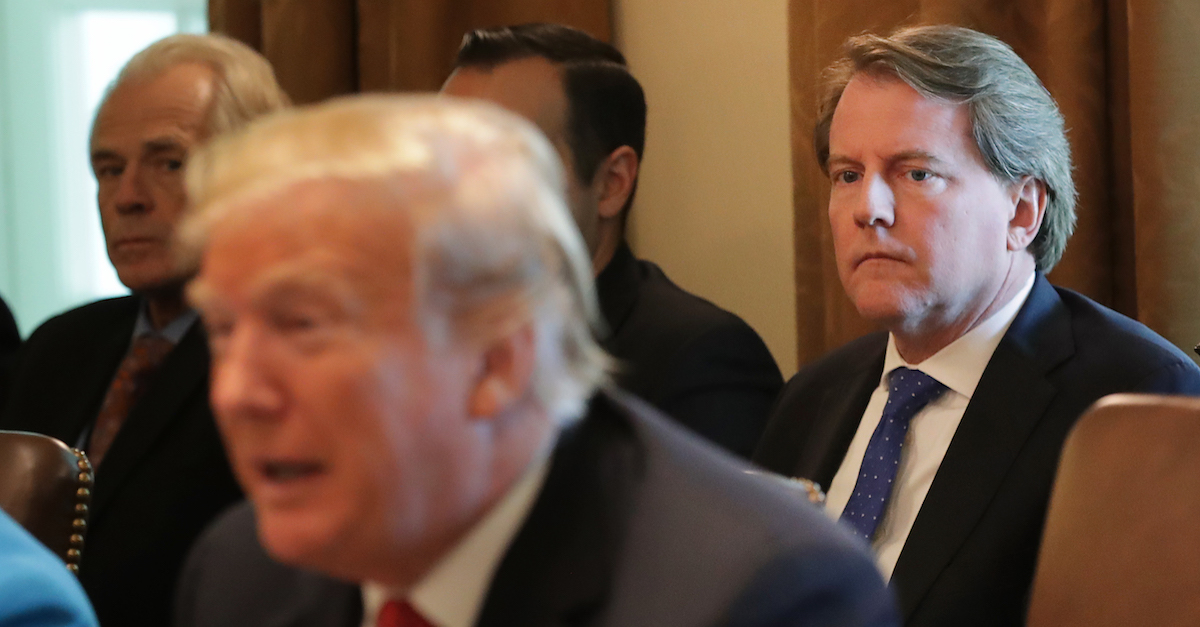
Special Counsel Robert Mueller had a lot to say about what Don McGahn knew (and refused to do) during his time as White House counsel to President Donald Trump. House Democrats responded by numbering McGahn among the many recipients of congressional subpoenas. Trump’s current White House counsel, however, is doing everything possible to keep McGahn from complying with the subpoena.
The requested documents were supposed to be produced by 10 a.m. on Tuesday.
White House counsel Pat Cipollone sent letters to both McGahn’s attorney William Burck and House Judiciary Committee Chairman Rep. Jerrold Nadler (D-N.Y.) today. The letters said that McGahn was directed not to comply with the subpoena.
“The subpoena seeks certain White House records provided to Mr. McGahn while was Counsel to the President that are related to Special Counsel Robert S. Mueller, III’s investigation,” Cipollone began. “The White House provided these records to Mr. McGahn in connection with its cooperation with the Special Counsel’s investigation and with the clear understanding that the records remain subject to the control of the White House for all purposes.”
If you’ve been reading Law&Crime lately, you would know that the words “executive privilege” come next.
“The White House records remain legally protected from disclosure under longstanding constitutional principles, because they implicate significant Executive Branch confidentiality interests and executive privilege,” Cipollone continued.
The predicament for McGahn has basically been as follows: risk being held in contempt by House Democrats or “be in contempt of his ethical obligations and legal obligations as a former White House official.”
McGahn is choosing not to comply with the subpoena and said through his attorney that this is the “appropriate response” right now.
“The committee seeks to compel Mr. McGahn to produce White House documents the executive branch has directed that he not produce,” Burck responded. “Where co-equal branches of government are making contradictory demands on Mr. McGahn concerning the same set of documents, the appropriate response for Mr. McGahn is to maintain the status quo unless and until the committee and the executive branch can reach an accommodation.”
Cipollone said that McGahn doesn’t have the right to disclosed privilege documents and that the Department of Justice agrees.
“Because Mr. McGahn does not have the legal right to disclose these documents to third parties, I would ask the Committee to direct any request for such records to the White House, the appropriate legal custodian,” Cipollone continued, saying that President Trump’s acting Chief of Staff Mick Mulvaney “directed” McGahn “not to produce” the requested documents.
“The Department of Justice is aware of and concurs with this legal position,” Cipollone said.
National security lawyer Bradley P. Moss told Law&Crime that it is “clear” that the White House “will take every step they can to drag this out and delay critical oversight until after the 2020 election.”
“In the end, they know that their legal position will likely fail on the merits, at least in part, but it will take time for that to work its way through the court system. It may not necessarily be the best political strategy to pursue but it’s the one they’ve chosen,” Moss said. “I would be surprised if Mr. McGahn went against instructions from the White House here. More than anything else, he wants to avoid any type of ethical complaints being raised by the president’s allies that could jeopardize his ability to continue practicing law. A martyr he is not.”
CNN legal analyst, attorney and impeachment expert Ross Garber told Law&Crime that litigation could “outlast two Trump terms.” Garber noted that McGahn is “bound by rules of professional conduct that require him to keep secrets of his former client.”
As for House Democrats, much the information they seek is “likely covered by executive privilege,” according to Garber. Democrats may also have a difficult time showing a need for the information if they don’t decide to push forward with an impeachment effort.
Garber noted, however, that the House may be able to obtain some information after negotiating with the White House. As Burck noted above, some other “accommodation” may occur.
McGahn ended up being a key figure in the obstruction volume of Mueller’s report. Mueller described Trump ordering McGahn on two occasions to go to Deputy Attorney General Rod Rosenstein and ask him to fire Mueller.
We know about this Trump-McGahn incident because Mueller got McGahn to recall the directive. “You gotta do this. You gotta call Rod,” Trump said, according to McGahn. We also know that McGahn disobeyed Trump’s orders and was afraid that a “Saturday Night Massacre” was a real threat. Mueller said that Trump’s attempts to influence the investigation were “mostly unsuccessful” precisely because White House staffers, McGahn included, “declined to carry out orders“:
The President’s efforts to influence the investigation were mostly unsuccessful, but that is largely because the persons who surrounded the President declined to carry out orders or accede to his requests. [James] Comey did not end the investigation of [Michael] Flynn, which ultimately resulted in Flynn’s prosecution and conviction for lying to the FBI. [Don] McGahn did not tell the Acting Attorney General that the Special Counsel must be removed, but was instead prepared to resign over the President’s order. [Corey] Lewandowski and [Rick] Dearborn did not deliver the President’s message to [Jeff] Sessions that he should confine the Russia investigation to future election meddling only. And McGahn refused to recede from his recollections about events surrounding the President’s direction to have the Special Counsel removed, despite the President’s multiple demands that he do so.
White House Letter to Cong… by on Scribd
[Image via Chip Somodevilla/Getty Images]